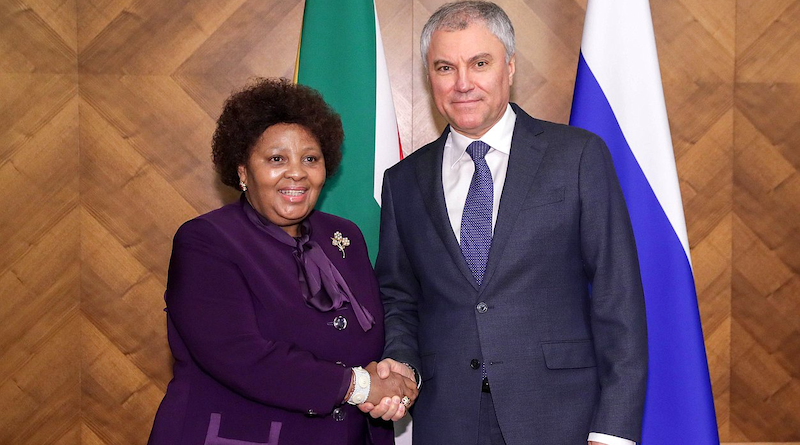Russia and African parliamentarians continue forging solidarity against growing neo-colonial tendencies in Africa. The parliamentarians, far ahead of their symbolic gathering, have intensified political dialogue and support for Russia’s war on neighbouring Ukraine, and further expressed readiness to support Africa’s economic development.
Russia has come under stringent economic sanctions from the United States and Europe due to the ‘special military operation’ that it began since February 2022, more than a year that has adversely affected Africa. It has also divided Africa’s voting at the United Nations, with some experts arguing that such sharp divisions, in terms of voting either for or against, abstaining or keeping neutral, could influence Africa’s unity in the continent.
Some policy experts still expect high symbolism at the 2023 Russia-Africa summit as official working visits have become more frequent and Africa receives greater coverage in Russian media. The experts say, instead of measuring the success of the summit by African leaders attendance, as happened in 2019, the parties give greater attention to the substance of the agenda, which is under development. Russia should try to increase its presence in Africa while avoiding direct confrontation with other non-regional and foreign players.
According to the experts, Russia’s efforts for now are not practically showing tangible results. Russia has to open its doors more to African visitors and tourists, these could bring together anyone interested in expanding all-inclusive dialogue and anyone who is ready to help promote initiatives possibly for increasing socio-economic development between Russia and the African states and raise the well-being of their citizens.
That however, undeterred by the pressure from the United States ‘to cancel Russia’ in their relationship, Africa parliamentarians have arrived in Moscow for two-day working gathering to methodically develop Russian-African relations in various fields. In addition, to the political dialogue, they are also focusing on economic, cultural, humanitarian and scientific cooperation.
According to the plan, Russian parliamentarians and African colleagues fixed topical issues of the international parliamentary agenda for discussions: parliamentary support of scientific and educational cooperation, legislative response to economic challenges, indivisible security: capabilities and contributions of parliaments, and neocolonialism of the West: how to prevent the repetition of history.
On March 20, the main conference entitled “Russia-Africa in the multipolar world” at the State Duma (the Pillar Hall of the House of the Unions). More than 40 official parliamentary delegations from almost all African countries already arrived for the conference. Representatives of the scientific, educational and expert communities from Russia and African countries, members of the State Duma, federal executive authorities, senators of the Federation Council, chairmen of the legislative bodies of the constituent entities of the Russian Federation.
There was a bilateral meeting of the Chairman of the State Duma Vyacheslav Volodin and Speaker of the National Assembly of the Parliament of South Africa Nosiviwe Mapisa-Nqakula at the State Duma. The Speaker stressed that the Republic highly appreciated the dialogue with Russia.
Speaker Volodin noted that attempts by Washington and Brussels to isolate Africa and Russia have failed. He is convinced that the parliaments could do a lot for further development of relations on the principles of respect, non-interference in internal affairs of other states and mutually beneficial cooperation.
He stressed that relations between Russia and the Republic of South Africa were developing with the help of cooperation between the presidents of the two states. “We have great capabilities and we should use the parliamentary dimension to do everything to enhance our cooperation in various areas,” added Volodin. He suggested preparing and signing a relevant agreement between the State Duma and the National Assembly of the Parliament of South Africa, as well as creating a high-level commission. Nosiviwe Mapisa-Nqakula supported his suggestion.
Mapisa-Nqakula thanked Vyacheslav Volodin for sending the invitation to take part in the Parliamentary Conference, before adding “It is very important for us that Russia gives priority to the African continent. Many countries consider Africa as a great possibility to get African resources. But taking into account the history of our cooperation, we, like many other African countries, believe that Russia has other, more genuine interests in Africa.”
“Our cooperation started decades ago. And we felt your support in the worst times for us, during apartheid. We understand that now it is a difficult time for Russia as a country. But I would like to assure you that South Africa will continue cooperation, discuss areas of cooperation that are important for us. We look forward to its start,” said Nosiviwe Mapisa-Nqakula.
The speakers also discussed issues of cooperation within the framework of the BRICS, as it is South Africa’s chairmanship. “For us, the cooperation between the parliaments within the BRICS framework is very important, as we can discuss issues of common interest,” emphasized the Speaker of the National Assembly of the Parliament of South Africa.
“Our Conference will be an important stage in the process of preparing for the second Russia-Africa summit which is planned to be held in Saint Petersburg this summer with participation of the heads of states,” concluded the Chairman of the State Duma.
According reports monitored by this author, there are 17 specialized working groups that focus on various areas of cooperation between Russia and Africa. The expectation is that these working would come up with useful initiatives to be incorporated into an action plan 2023-2026 and further cement the entire complex of relations between Russia and the African countries.
Russian President Vladimir Putin will speak at the Russia-Africa parliamentary conference on Monday, Kremlin aide Yury Ushakov told reporters. “On March 20, when the president receives the Chinese leader, he will address the 2nd parliamentary conference Russia-Africa,” Ushakov, who heads the organizing committee of the summit, said, adding that the event would pave the way for the 2nd Russia-Africa summit, scheduled to take place from July 27-28 in St. Petersburg, second largest city of Russia

